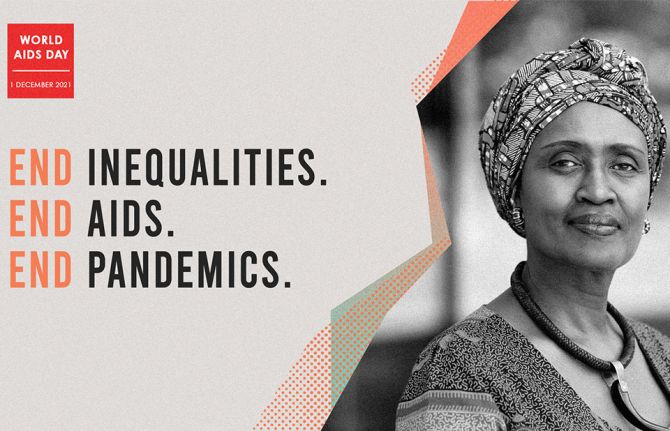

Press Statement
World AIDS Day 2021 message from UNAIDS Executive Director Winnie Byanyima
01 December 2021 01 December 2021Dear friends,
Greetings on this World AIDS Day, and my solidarity with all around the world as we confront the impact of colliding pandemics.
This year, the world agreed on a bold plan that, if leaders fulfil it, will end AIDS by 2030. That’s so exciting.
But today we, as the Joint United Nations Programme on HIV/AIDS, issue a stark warning. AIDS remains a pandemic, the red light is flashing and only by moving fast to end the inequalities that drive the pandemic can we overcome it.
Where leaders are acting boldly and together, bringing together cutting-edge science, delivering services that meet all people’s needs, protecting human rights and sustaining adequate financing, AIDS-related deaths and new HIV infections are becoming rare.
But this is only the case in some places and for some people.
Without the inequality-fighting approach we need to end AIDS, the world would also struggle to end the COVID-19 pandemic and would remain unprepared for the pandemics of the future. That would be profoundly dangerous for us all.
Progress in AIDS, which was already off track, is now under even greater strain as the COVID-19 crisis continues to rage, disrupting HIV prevention and treatment services, schooling, violence prevention programmes and more.
On our current trajectory, we aren’t bending the curve fast enough and risk an AIDS pandemic lasting decades. We have to move faster on a set of concrete actions agreed by United Nations Member States to address the inequalities that are driving HIV.
Through fighting the AIDS pandemic, we have learned a lot about what we need more of for AIDS and for all pandemics.
We urgently need sufficient community-led and community-based infrastructure as part of a strong public health system, underpinned by robust civil society accountability.
We need policies to ensure fair and affordable access to science.
Every new technology should reach each and everyone who needs it without delay.
We need to protect our health workers and expand their numbers to meet our urgent needs.
We must protect human rights and build trust in health systems.
It is these that will ensure we close the inequality gaps and end AIDS. But they are too often applied unevenly, are underfunded and are underappreciated.
I salute the front-line communities that have pioneered the approaches shown to be most effective, that have driven the momentum for change and that are pushing leaders to be bold. I urge you: keep pushing.
World leaders must work together urgently to tackle these challenges head-on. I urge you: be courageous in matching words with deeds.
There is not a choice to be made between ending the AIDS pandemic that is raging today and preparing for the pandemics of tomorrow. The only successful approach will achieve both. As of now, we are not on track to achieve either.
If we take on the inequalities that hold back progress, we can deliver on the promise to end AIDS by 2030. It is in our hands.
Every minute that passes, we are losing a precious life to AIDS. We don’t have time.
End inequalities. End AIDS. End pandemics.
Thank you.
UNAIDS
The Joint United Nations Programme on HIV/AIDS (UNAIDS) leads and inspires the world to achieve its shared vision of zero new HIV infections, zero discrimination and zero AIDS-related deaths. UNAIDS unites the efforts of 11 UN organizations—UNHCR, UNICEF, WFP, UNDP, UNFPA, UNODC, UN Women, ILO, UNESCO, WHO and the World Bank—and works closely with global and national partners towards ending the AIDS epidemic by 2030 as part of the Sustainable Development Goals. Learn more at unaids.org and connect with us on Facebook, Twitter, Instagram and YouTube.
